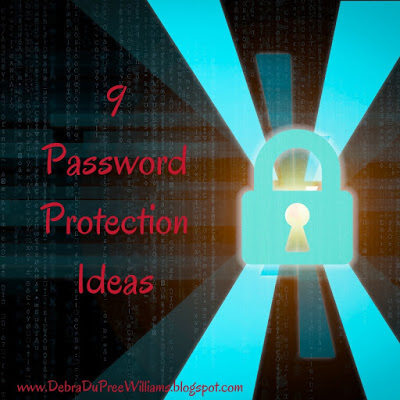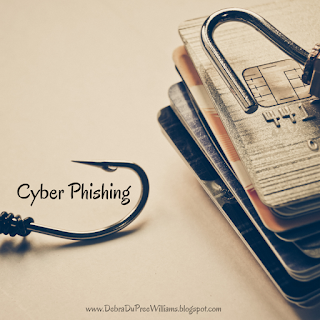9 Password Protection Ideas
By Debra DuPree Williams @DDuPreeWilliams
I am not a happy camper. And I’m sure I’m not the only one. Today, when I logged onto one of my frequently visited sites, my search engine informed me that my password for an associated site had been compromised. Now, I’m no techie so I may not be using correct terminology here, but you get the idea.
Now, how they knew that is beyond my pay level, believe me. They informed me that I need to change all my passwords. Bummer. That’s about all I have to say about that. If you’re like me, you have a hard-enough time creating decent, hopefully secure passwords in the first place.
One thing I do which is not highly recommended, but I do it anyway, is I keep my passwords written down. What can I say? I’m old. No way could I remember all the passwords I must maintain.
In reaction, I went looking for what the latest thinking is about what a good, secure password should be. Here are a few of their suggestions. I got these from various places, and some are just my own ideas, some things my hubby and I have done for years.
Nine Ideas Worth Trying
Use a different password for every site. I know, I know. It would be a whole lot easier to use just one for everything. I get it, really, I do. But that isn’t what the experts say is safe. Think about using that one and it just got hacked and now it gives that person who has absolutely nothing else to do, access to all your passworded sites. So, go ahead and make up your mind—each site gets its own password.
Use a password phrase. Here is how that works. You pick a phrase that means something to you. “I hope the Bucs go to the Super Bowl in 2020!” Now, you take the first letter of each word, IhtBgttSBi2020! Nonsense, long, and you made it up, so you should remember it. BUT you must do that for each site you have. Good grief. If you can only have twelve characters, which is suggested by most places, then cut your phrase a bit. “I hope the Bucs win Super Bowl #49 in 20.” That looks like this. IhtBwSB49i20. Notice I cut out the # symbol. Still need 12 but want that # in there, then do it this way and leave off that last i for in. It looks like this—IhtBwSB#4920. That’s twelve symbols. Or use your first pet’s name and the year you got it, throw in a couple of your favorite symbols, and you’re good. Anything that isn’t readily available knowledge. But make sure it is something you know you will remember.
The experts say your password needs to be at least 12 characters long. I mentioned that above, but it doesn’t hurt to repeat it. I’ll admit, most of mine aren’t this long. Not good enough so say the experts. Guess I have some work to do.
Be sure to include numbers and symbols, not just letters. But don’t use obvious ones. Substitute a symbol for a letter. Then go back to that phrase you just made up and insert those you like.
Don’t post your passwords out in the open. That may sound obvious, too, but you’d be surprised how many people put them on a sticky note on the front of their monitor. I think we all know people who post it in sight.
Don’t do that.
Don’t do that.
Use multi-level authentication. I like this one and it’s something I do. Many sites now allow you to tell them you want them to send a code to your cell phone before you can sign in. It may seem time-consuming and aggravating, but it is a whole lot better than being hacked.
Don’t forget to keep everything secure. That means, if you go to a cyber place to work, such as a coffee shop or library, make sure you log out when you leave. There exists malicious software, such as keystroke counters, that record all your keystrokes. Those can be used to steal your passwords. Make sure your anti mal-ware and your operating systems are up to date and don’t forget to log out.
Be careful and aware. If something looks fishy, it probably is. Don’t know if that site that’s telling you to change your password is legit? Log out of where you are and go back in but change your password first. Then check out the message. Someone could be phishing.
Change your passwords often. I know. So many and so little time. Just take the time to do it. It’s so much better than having your work or your ID stolen.
Don’t forget to guard not just your laptop or desktop, but your phone, your iPad, anything you have that requires a keyboard of some kind and passwords. Make those passwords memorable to you but difficult, if not impossible, for any hackers out there. They are getting more and more sophisticated and your best plan of action is to stay one step ahead.
These may not keep the hackers out of your life, but it will certainly give them pause when and if they come upon your sites. Make the bad guys sorry they ever came upon you.
Have you encountered issues with password safety? Tell us how you dealt with it. We’d love to learn something that will benefit us all.
TWEETABLE



No Comments